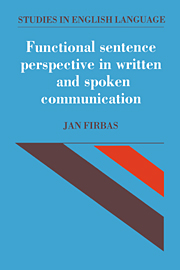Book contents
- Frontmatter
- Contents
- Preface
- List of abbreviations
- Part I Functional sentence perspective in written communication
- 1 Introduction
- 2 The sentence and the carriers of communicative dynamism
- 3 The contextual factor
- 4 The semantic factor
- 5 The theme and the non-theme
- 6 Some special issues of the theory of functional sentence perspective
- 7 Word order and functional sentence perspective
- Part II Functional sentence perspective in spoken communication
- References
- Index
3 - The contextual factor
Published online by Cambridge University Press: 19 November 2009
- Frontmatter
- Contents
- Preface
- List of abbreviations
- Part I Functional sentence perspective in written communication
- 1 Introduction
- 2 The sentence and the carriers of communicative dynamism
- 3 The contextual factor
- 4 The semantic factor
- 5 The theme and the non-theme
- 6 Some special issues of the theory of functional sentence perspective
- 7 Word order and functional sentence perspective
- Part II Functional sentence perspective in spoken communication
- References
- Index
Summary
The introductory chapter has given a rough sketch of the interplay of the three factors that determine the distribution of degrees of CD over a written sentence and in this way its FSP (see p. n). The present chapter will concentrate on the operation of what for convenience is termed the ‘contextual factor’; what is actually in play is the retrievability/irretrievability from the immediately relevant context (see ibid.). Since context is a complex phenomenon, the chapter will have to deal with a number of questions (see Daneš 1974b: 109–10). As Daneš has pointed out (ibid.), one of them is the relative and very broad (if not vague) character of the notions of given (known, old) and new (unknown) information. This question will be taken up first.
Known information and the structure of context
An examination of the function of the articles in FSP (Firbas 1957, 1966) shows that information marked by the definite article as known cannot always be regarded as such from the point of view of FSP. The following sentence will illustrate.
Beryl stepped over the window, crossed the veranda, ran down the grass to the gate. He was there behind her.
(M 62)(For abbreviations following example sentences or passages and indicating the sources, see the list of abbreviations, pp. xiii–xv. The number after the abbreviation indicates the page of the source.)
In view of the development of the narration, the elements the window, the veranda, the grass and the gate convey new information, although they have already occurred in the story and in this sense convey information that is known.
- Type
- Chapter
- Information
- Publisher: Cambridge University PressPrint publication year: 1992



